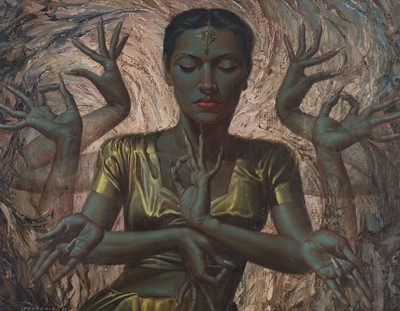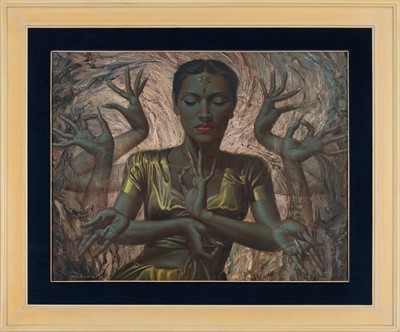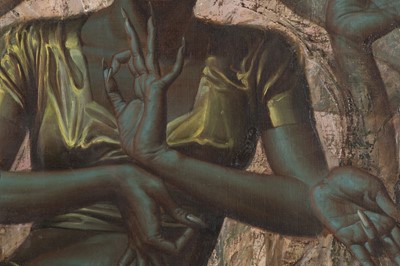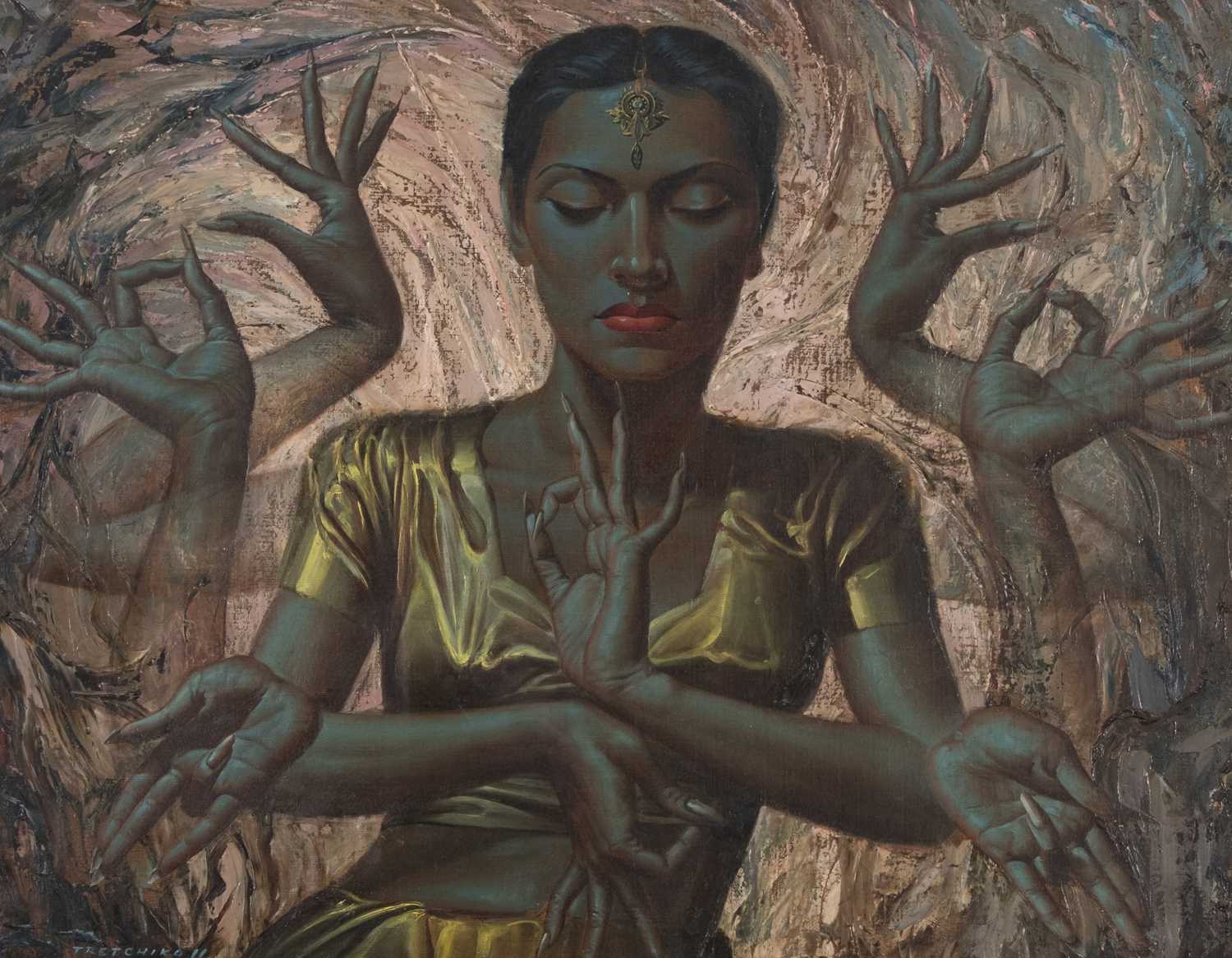20th Apr, 2024 18:00
TAKING FLIGHT: Selected Works from the Phoenix Collection
9
Vladimir Tretchikoff (South Africa 1913-2006)
The Hindu Dancer
oil on canvas
Artwork date: 1951
Signature details: signed and dated bottom left; printed with the artist's name, title and exhibition date on an Iziko South African National Gallery label on the reverse
Exhibited: Iziko South African National Gallery, Cape Town, 'Tretchikoff: The People's Painter', 26 May to 25 September 2011.
Literature: Lamprecht, A. (2011). 'Tretchikoff: The People's Painter', Johannesburg: Jonathan Ball Publishers., illustrated in colour on p.73.
Tretchikoff: The People's Painter (2011). [Exhibition catalogue]. Iziko South African National Gallery, Cape Town. 26 May to 25 September 2011. illustrated in colour on page 9, cat. no. 32.
Timmins, H. (1969). 'Tretchikoff', Cape Town: Howard Timmins., Illustrated in colour.
Sold for R1,715,625
Estimated at R1,500,000 - R2,000,000
Condition Report
The condition overall is excellent.
Minor surface dust throughout.
Minor cracking to a small area in the bottom left corner.
Minor indentation to the canvas in the top right quadrant.
Two negligible chips to the paint, under the nose and on the fourth finger of the central hand.
Please note, we are not qualified conservators and these reports give our opinion as to the general condition of the works. We advise that bidders view the lots in person to satisfy themselves with the condition of prospective purchases.
oil on canvas
Artwork date: 1951
Signature details: signed and dated bottom left; printed with the artist's name, title and exhibition date on an Iziko South African National Gallery label on the reverse
Exhibited: Iziko South African National Gallery, Cape Town, 'Tretchikoff: The People's Painter', 26 May to 25 September 2011.
Literature: Lamprecht, A. (2011). 'Tretchikoff: The People's Painter', Johannesburg: Jonathan Ball Publishers., illustrated in colour on p.73.
Tretchikoff: The People's Painter (2011). [Exhibition catalogue]. Iziko South African National Gallery, Cape Town. 26 May to 25 September 2011. illustrated in colour on page 9, cat. no. 32.
Timmins, H. (1969). 'Tretchikoff', Cape Town: Howard Timmins., Illustrated in colour.
(1)
77 x 99.5 cm; framed size: 112 x 134.5 x 4.5 cm
Provenance:
Stephan Welz & Co., Cape Town, Decorative & Fine Arts, 10 May 2016, lot 840.
Stephan Welz & Co., Cape Town, Decorative & Fine Arts, 4 to 5 June 2013, lot 554.
Acquired directly from the artist in the early 1960s.
ABOUT THE ARTWORK
The subject of this work, then 17-year-old Champa Manooa, née Chameli, was a Durban-based dancer, whose identity would remain a mystery until the painting that she sat for went on auction in Cape Town over 10 years ago, in 2013. Chameli Jain, daughter of the famous almond-eyed beauty recalled her mother’s anecdotes about her experience working with Tretchikoff. Champa met Vladimir Tretchikoff at one of his immensely popular department store exhibitions in Durban. Here, Champa “fell in love with”[1] Tretchikoff’s Dying Swan (1949), which depicted prima ballerina Alicia Markova in her most famous dance role.
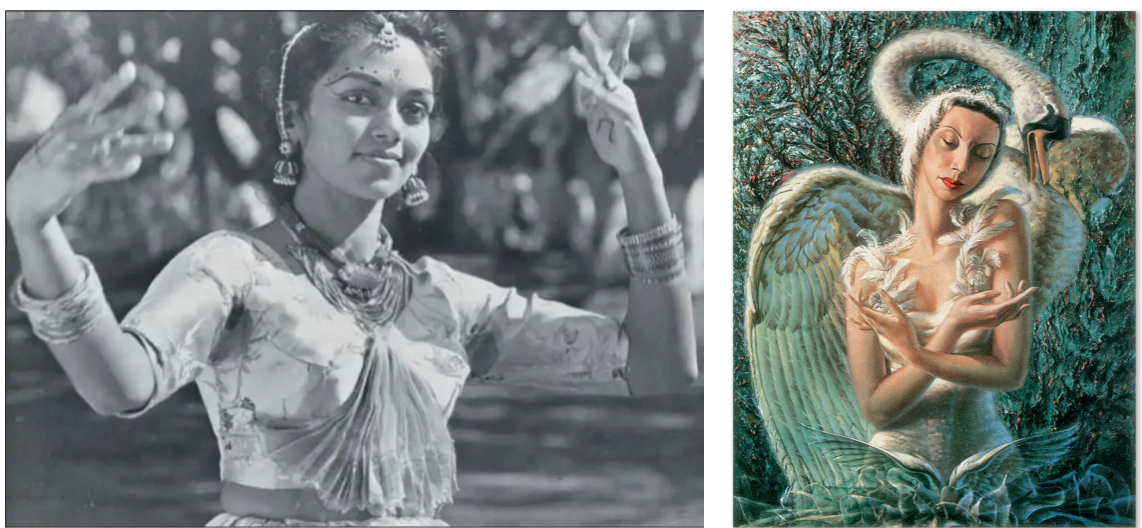
LEFT: A photograph of Champa Manooa in the 1960s
RIGHT: Tretchikoff Dying Swan (1949)
After a short exchange, Champa found herself on a train to Cape Town to sit for the artist. The final painting of Champa, The Hindu Dancer, is a sensational portrayal of the young woman who must have been thrilled to have been immortalised in a work which held remarkable correlations to Dying Swan (1949). Sharing both a softness and femininity, the two works depict their subjects caught in a moment of their respective dance styles, using expressive hand gestures and body language to translate the essence of the stories they are telling.
In The Hindu Dancer, Tretchikoff masterfully conveyed movement by incorporating multiple body positions into one composition. The artist's depiction of a multi-limbed dancer evokes the sensation of capturing the subject mid-dance, enhanced by the illusion of movement created with expressive, dynamic brushwork in the background. This effect conjures the imagery of a cinematic stop-motion sequence unfolding before the viewer's eyes. Champa Manooa recalls Tretchikoff saying that he did not want to pick just one hand gesture from her Indian Classical Dance, so he incorporated all of the mudras that were of cultural importance.[2] The dynamic feeling evoked in The Hindu Dancer shows the beginnings of Tretchikoff’s experimentation with movement, where the artist used line and colour to indicate motion by disintegrating solid form. Indeed, Boris Gorelik, author of Incredible Tretchikoff (2013), notes that the painting is, “probably the first of [Tretchikoff’s] 'action' studies, in which he tried to capture motion on canvas in the same way that Futurists had done before him".[3]
Throughout Tretchikoff’s career, colour was perhaps the most powerful tool in the artist’s arsenal. While many criticised his use of a non-mimetic palette and considered it garish, the blue-green hues seen in the skin tone of The Hindu Dancer, coupled with the juxtaposing yellows and golds of the drapery, would eventually be considered Tretchikoff’s signature, and most successful, palette. Using colour that did not imitate reality allowed the artist to create a sense of depth, mood and atmosphere. The jewel-like tones give the subject an etherealness, and her skin an iridescent and radiant quality. Tretchikoff's treatment of the dress drapery, with luminous highlights, imbues the fabric with a metallic sheen, evoking a tactile sensation of silkiness. This technique not only enhances the artwork's visual appeal but imparts a sense of regality and significance to this remarkable piece.
[1] Quote from an interview with Chameli Jain Fourie, B & Wolhuter, B. (2013). Tretchikoff’s Dancer found at last, IOL, 7 June. [online]. Available: https://www.iol.co.za/news/south-africa/kwazulu-natal/tretchikoffs-dancer-found-at-last-1528850
[2] Ibid
[3] Davids, N (2013). Tretchikoff poser a real poser, TimesLive, 3 June. [online]. Available: https://www.timeslive.co.za/news/south-africa/2013-06-03-tretchikoff-poser-a-real-poser/#google_vignette
COLLECTOR'S NOTE
- The original Chinese Girl painting currently holds the record for a Tretchikoff work sold at auction, selling for an impressive $1 486 424 in London in 2013.
- Vladimir Tretchikoff is considered one of the greatest commercial artists of all-time, with his most prolific work, Chinese Girl, recorded as the most highly circulated print in art history, selling more than half a million large-format reproductions worldwide by the end of the artist’s career.
- In 2011, a major retrospective exhibition, Tretchikoff: The People’s Painter, curated by Andrew Lamprecht was held at the Iziko South African National Gallery in Cape Town.
- A book, Tretchikoff: The People’s Painter, was published to accompany the exhibition. Edited by Lamprecht it included essays by Boris Gorelik, Yvonne du Toit, Melvyn Minaar and Ashraf Jamal.
- Further acclaimed publications include, The Gold Book, a large format book written and published by Howard Timmins in 1969 and Incredible Tretchikoff: Life of an Artist and Adventurer by Boris Gorelik in 2013.
COLLECTIONS:
The artist is represented in numerous local and international collections, notably, the; Rupert Museum, Stellenbosch; Delaire Graff Estate, Stellenbosch; Oyster Box Hotel, Durban and Browns Jewellers, Johannesburg.
You can place an absentee bid through our website - please sign in to your account on our website to proceed.
In the My Account tab you can also enter telephone bids, or email bids@aspireart.net to log telephone/absentee bids.
Join us on the day of the auction to follow and bid in real-time.
The auction will be live-streamed with an audio-visual feed.
Auction: TAKING FLIGHT: Selected Works from the Phoenix Collection, 20th Apr, 2024
Viewing
AUCTION PREVIEW
29 March – 20 April
Monday – Sunday: 9am – 5pm
Fridays: 9am – 7pm
Open for viewing on the Easter Weekend and Public Holidays.
Currency conversions are based on the exchange rate at the auction's start time and date. Bidders should verify the current exchange rate on the day of the sale. All invoices and payments must be made in South African Rands.
IMPORTANT NOTICE:
Logistics
While we endeavour to assist our Clients as much as possible, we require artwork(s) to be delivered and/or collected from our premises by the Client. In instances where a Client is unable to deliver or collect artwork(s), Aspire staff is available to assist in this process by outsourcing the services to one of our preferred Service Providers. The cost for this will be for the Client’s account, with an additional Handling Fee of 15% charged on top of the Service Provider’s invoice.
Aspire Art provides inter-company transfer services for its Clients between Johannesburg and Cape Town branches. These are based on the size of the artwork(s), and charged as follows:
Small (≤60x90x10 cm): R480
Medium (≤90x120x15 cm): R960
Large (≤120x150x20 cm): R1,440
Over-size: Special quote
Should artwork(s) be collected or delivered to/from Clients by Aspire Art directly, the following charges will apply:
Collection/delivery ≤20km: R400
Collection/delivery 20km>R800≤50km
Collection/delivery >50km: Special quote
Packaging
A flat fee of R100 will be added to the invoice for packaging of unframed works on paper.
International Collectors Shipping Package
For collectors based outside South Africa who purchase regularly from Aspire Art’s auctions in South Africa, it does not make sense to ship artworks individually or per auction and pay shipping every time you buy another work. Consequently, we have developed a special collectors’ shipping package to assist in reducing shipping costs and the constant demands of logistics arrangements.
For buyers from outside South Africa, we will keep the artworks you have purchased in storage during the year and then ship all the works you have acquired during the year together, so the shipping costs are reduced. At the end of the annual period, we will source various quotes to get you the best price, and ship all your artworks to your desired address at once.
Aspire Art will arrange suitable storage during, and cost-effective shipping at the end, of the annual period.
Collections
Collections are by appointment, with 24-hours’ notice
Clients are requested to contact the relevant office and inform Aspire Art of which artwork(s) they would like to collect, and allow a 24-hour window for Aspire Art’s logistics department to retrieve the artwork(s) and prepare them for collection.
Handling Fee
Aspire Art charges a 15% Handling Fee on all Logistics, Framing, Restoration and Conservation arranged by Aspire.
